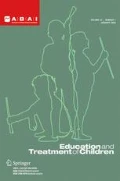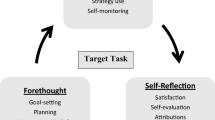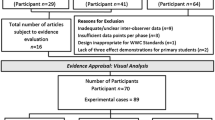Abstract
The purpose of this study was to evaluate the use of behavioral skills training (BST) that included video vignettes used for modeling and rehearsal to train preservice general educators how to collect accurate antecedent-behavior-consequence (ABC) data using a structured recording format. The effectiveness of the intervention was evaluated within the context of a multiple probe single-case research design. This study also assessed generalization of collecting correct ABC data across a narrative format, given that this format is commonly used in schools. BST was effective for training preservice general educators to collect ABC data using a structured recording format and participants also generalized this skill to a narrative recording format. These findings extend the literature on BST as an intervention that can improve preservice general educators’ behavioral abilities. Practical implications and future areas of research are provided.


Similar content being viewed by others
References
Anderson, C. M., & St. Peter, C. C. (2013). Functional analysis with typically developing children: Best practice or too early to tell?: In response to Hanley (2012). Behavior Analysis in Practice, 6(2), 62–76.
Barton, E. E., Lloyd, B. P., Spriggs, A. D., & Gast, D. L. (2018). Visual analysis of graphic data. In J. R. Ledford & D. L. Gast (Eds.), Single case research methodology: Applications in special education and behavioral sciences (3rd ed., pp. 179–214). Routledge.
Brock, M. E., Canella-Malone, H. I., Seaman, R. L., Andzik, N. R., Schaefer, J. M., Page, E. J., Barczak, M. A., & Dueker, S. A. (2017). Findings across practitioner training studies in special education: A comprehensive review and meta-analysis. Exceptional Children, 84, 7–26. https://doi.org/10.1177/0014402917698008
Butler, A., & Monda-Amaya, L. (2016). Preservice teachers’ perceptions of challenging behavior. Teacher Education & Special Education, 39(4), 276–292. https://doi.org/10.1177/0888406416654212
Drake, G., Pomerance, L., Rickenbrode, R., & Walsh, K. (2018). The 2018 teacher prep review. National Council on Teacher Quality. https://www.nctq.org/dmsView/2018_Teacher_Prep_Review_733174
Fallon, L. M., Collier-Meek, M. A., & Kurtz, K. D. (2019). Feasible coaching supports to promote teachers’ classroom management in high-need settings: An experimental single case design study. School Psychology Review, 48, 3–17. https://doi.org/10.17105/SPR-2017-0135.V48-1
Flower, A., McKenna, J. W., & Haring, C. D. (2017). Behavior and classroom management: Are teacher preparation programs really preparing our teachers? Preventing School Failure, 61(2), 163–169. https://doi.org/10.1080/1045988X.2016.1231109
Gast, D. L., Lloyd, B. P., & Ledford, J. L. (2018). Multiple baseline and multiple probe designs. In J. R. Ledford & D. L. Gast (Eds.), Single case research methodology: Applications in special education and behavioral sciences (3rd ed., pp. 239–281). Routledge.
Hanley, G. P. (2012). Functional assessment of problem behavior: Dispelling myths, overcoming implementation obstacles, and developing new lore. Behavior Analysis in Practice, 5(1), 54–72.
Hanushek, E. A., Kain, J. F., & Rivkin, S. G. (2004). Why public schools lose teachers. Journal of Human Resources, 39, 326–354. https://doi.org/10.2307/3559017
Hogan, A., Knez, N., & Kahng, S. W. (2015). Evaluating the use of behavioral skills training to improve school staffs’ implementation of behavior intervention plans. Journal of Behavioral Education, 24, 242–254. https://doi.org/10.1007/s10864-014-9213-9
Homlitas, C., Rosales, R., & Candel, L. (2014). A further evaluation of behavioral skills training for implementation of the picture exchange communication system. Journal of Applied Behavior Analysis, 47, 198–203. https://doi.org/10.1002/jaba.99
Horner, R. H., & Yell, M. L. (2017). Commentary on Zirkel: Judicial rulings specific to FBAs or BIPs under the IDEA and corollary state laws—an update. Journal of Special Education, 51(1), 57–59. https://doi.org/10.1177/0022466917697289
Individuals with Disabilities Education Improvement Act (2004). Pub. L. No. 108-446; 20 U.S.C. §§ 1401 et seq.
Lane, K. L., Weisenbach, J. L., Little, M. A., Phillips, A., & Wehby, J. (2006). Illustrations of function-based interventions implemented by general education teachers: Building capacity at the school site. Education & Treatment of Children, 29(4), 549–571.
Lane, K. L., Oakes, W. P., Powers, L., Diebold, T., Germer, K., Common, E. A., & Brunsting, N. (2015). Improving teachers’ knowledge of functional assessment-based interventions: Outcomes of a professional development series. Education & Treatment of Children, 38, 93–120. https://doi.org/10.1353/etc.2015.0001
Ledford, J. R., Lane, J. D., & Gast, D. L. (2018). Dependent variables, measurement, and reliability. In J. R. Ledford & D. L. Gast (Eds.), Single case research methodology (3rd ed., pp. 97–132). Routledge.
Lerman, D. C., & Iwata, B. A. (1993). Descriptive and experimental analysis of variables maintaining self-injurious behavior. Journal of Applied Behavior Analysis, 26, 293–319.
Lerman, D. C., Hovanetz, A., Strobel, M., & Tetreault, A. (2009). Accuracy of teacher-collected descriptive analysis data: A comparison of narrative and structured recording formats. Journal of Behavioral Education, 18, 157–172. https://doi.org/10.1007/s10864-009-9084-7
Luna, O., Petri, J. M., Palmier, J., & Rapp, J. T. (2018). Comparing accuracy of descriptive assessment methods following a group training and feedback. Journal of Behavioral Education, 27, 488–508.
Markelz, A., Riden, B., & Scheeler, M. C. (2017). Generalization training in special education teacher preparation: Does it exist? Teacher Education & Special Education, 40(3), 179–193. https://doi.org/10.1177/0888406417703752
Martens, B. K., Baxter, E. L., McComas, J. J., Sallade, S. J., Kester, J. S., Caamano, M., Dimian, A., Simacek, J., & Pennington, B. (2019). Behavior Analysis: Research & Practice, 19(4), 343–356.
Miltenberger, R. G., Flessner, C., Gatheridge, B., Johnson, B., Satterlund, M., & Egemo, K. (2004). Evaluation of behavioral skills training to prevent gun play in children. Journal of Applied Behavior Analysis, 37, 513–516. https://doi.org/10.1901/jaba.2004.37-513
Moore, T. C., Wehby, J. H., Oliver, R. M., Chow, J. C., Gordon, J. R., & Mahany, L. A. (2017). Teachers’ reported knowledge and implementation of research-based classroom and behavior management strategies. Remedial & Special Education, 38(4), 222–232. https://doi.org/10.1177/0741932516683631
National Center for Education Statistics. (2016). Digest of Education Statistics, 2015. https://nces.ed.gov/fastfacts/display.asp?id=59
Neitzel, J., & Bogin, J. (2008). Steps for implementation: Functional behavior assessment. The Professional Development Center on Autism Spectrum Disorders, Frank Porter Graham Child Development Institute, University of North Carolina.
Oliver, A. C., Pratt, L. A., & Normand, M. P. (2015). A survey of functional behavior assessment methods used by behavior analysts in practice. Journal of Applied Behavior Analysis, 48(4), 817–829. https://doi.org/10.1002/jaba.256
Parker, R. I., & Vannest, K. J. (2009). An improved effect size for single-case research: Nonoverlap of all pairs. Behavior Therapy, 40, 357–367. https://doi.org/10.1016/j.beth.2008.10.006
Pence, S. T., & St. Peter, C. C. (2018). Training educators to collect accurate descriptive-assessment data. Education & Treatment of Children, 41(2), 197–222. https://doi.org/10.1353/etc.2018.0008
Roscoe, E. M., Phillips, K. M., Kelly, M. A., Farber, R., & Dube, W. V. (2015). A statewide survey assessing practitioners’ use and perceived utility of functional assessment. Journal of Applied Behavior Analysis, 48, 830–844. https://doi.org/10.1002/jaba.259
Scott, T. M., & Alter, P. J. (2017). Examining the case for functional behavior assessment as an evidence-based practice for students with emotional and behavioral disorders in general education classrooms. Preventing School Failure, 61, 80–93. https://doi.org/10.1080/1045988X.2016.1196645
Scott, J., Lerman, D. C., & Luck, K. (2018). Computer-based training to detect antecedents and consequences of problem behavior. Journal of Applied Behavior Analysis, 51(4), 784–801.
Shayne, R., & Miltenberger, R. G. (2013). Evaluation of behavioral skills training for teaching functional assessment and treatment selection skills to parents. Behavioral Interventions, 28, 4–21. https://doi.org/10.1002/bin.1350
Author information
Authors and Affiliations
Corresponding author
Ethics declarations
The study was performed in accordance with the ethical standards as laid down in the 1964 Declaration of Helsinki and its later amendments. All human participants were protected throughout the course of the study. Informed consent was secured prior to the start of the study. The authors have no conflict of interest.
Rights and permissions
About this article
Cite this article
Samudre, M.D., Allday, R.A. & Lane, J.D. Training Preservice General Educators to Collect Accurate Antecedent-Behavior-Consequence Data. Educ. Treat. Child. 45, 173–191 (2022). https://doi.org/10.1007/s43494-021-00064-0
Accepted:
Published:
Issue Date:
DOI: https://doi.org/10.1007/s43494-021-00064-0




